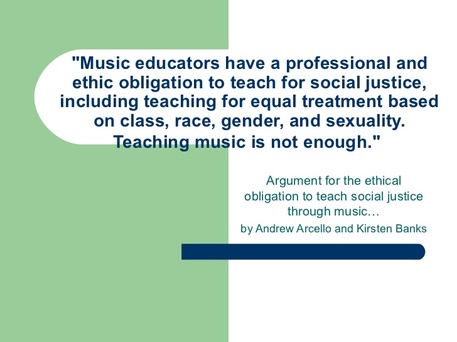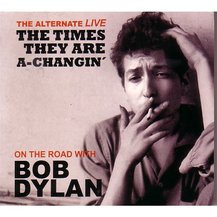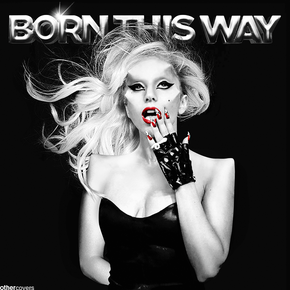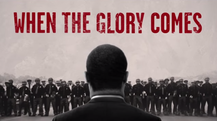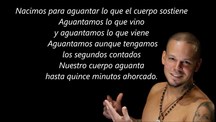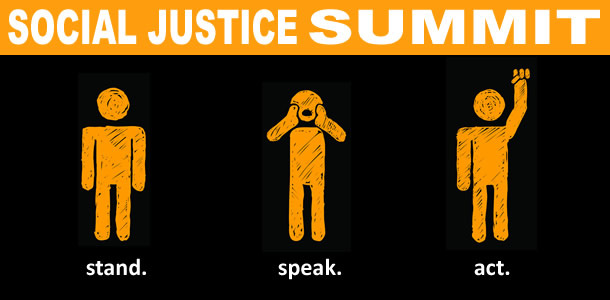Music and social justice
|
Music is more than a beat, a tune, or a combination of instruments. It is the powerful, thought-out message of the lyrics that makes the audience stop, think and reflect. Music is utilized as a tool for social justice and a method in promoting an alternative path to those in communities struggling with drugs and violence. As seen in TEDxNextGenerationAshville "Social Justice Through Music", and during historical events such as the Vietnam War, Civil Rights Movement, and Chicano Movement, we see how music has influence and promotes social justice in our society.
|
|
It's all about the music
|
"Propaganda is any systematic attempt to influence opinion on a wide scale. It is a from of communication that seeks to promote or discourage attitudes as a means of advancing or injuring an organization, an individual, or a cause...It usually addresses a mass audience through mass media or it is targeted at special audiences and media that provides access to mass opinion" (Grant, Mölleman, Morlandsö, Münz & Nuxoll, 2010, p. 4). As early as the fifteenth century, propaganda was an important and efficient method used to reform the Catholic Church. Today, propaganda has taken a new form that is creative, unique, and effective- music.
|
The evolution of music
Music in the past...There are many methods individuals use to spread awareness about social issued: protests, sit-ins, marches, strikes, and many more. Music has existed for a long time, and throughout the years it can be seen how music has adapted to the time period, now known as genres. Researchers have noticed that the music of the past and present contains messages about life, love, family, and even political views: "...music is a spiritual, virtual and creative place of comfort, consolidations and refuge and... provides a sense of purpose and a source of power...to enable, trigger and strengthen empathic responses, abilities and relationships [for] a core capacity within peace-building" (Grant et al., 2010, p. 8).
Bob Dylan, through his lyrics, exposed his opinions and views towards the issues that are occurring around him: "...Come senators, congressmen please heed the call don’t stand in the doorway, don’t block up the hall for he that gets hurt will be he who has stalled, there’s a battle outside and it is ragin’, it’ll soon shake your windows and rattle your walls for the times they are a-changin’" (Dylan). Bob Dylan is promoting the protests and the many things that people were doing to strive for equality and human rights as well as saying that the government should not be against the people; instead they should support the people.
|
Lady gaga's "born this way": the International gay anthem"Born This Way" is not just a song; it is an inspiration and os also known as the "International Gay Anthem" (Jang and Lee, p.5). Lady Gaga's hit song inspired many to fight and promote for the rights of the LGBTQ (Lesbian, gay, bisexual, transgender, and questioning individuals).
Music has the potential to create change in a society. In "When Pop Music Meets a Political Issue: Examining How 'Born This Way' Influences Attitudes Towards Gays and Gay Rights Policies," Jang and Lee discuss how Gaga's song has influenced LGBTQ communities in uniting and protesting for their rights both locally and globally. "Born This Way" is a mixture of the meaningful lyrics and the upbeat rhythms that motivate individuals into fighting and striving for justice. It is not only Lady Gaga that we see promoting this. Many artists create music to inspire and motivate the upcoming generations about the struggles individuals are encountering. Like Gaga, "Same Love" by Macklemore ft. Mary Lambert supports the LGBTQ community and their struggles for their rights. It is these artistsnn that remind us that music is not just a luxury, but a tool to strive for human rights and a just society. The evolution of music is based on beats, rhythms and style; however, the underlying messages that some artists are conveying remain the same: all hope to see society live in a place of peace, tranquility, and union.
|
Music in the making ... Lookin g at artists' workJust like the events that occurred decades or centuries ago, today we are encountering issues that have inspired a multitude of artists to use music "...as a way to unite people...like speeches [music] can have the power to inspire respect, change and desire to take action" (Baxter, 2007, p. 6).
John Legend and Common's "Glory" explores the issue that Black Lives Matter and are seeking justice on police brutality like in the Eric Gardner case, or like the Michael Brown Ferguson case.
Calle 13's (13th street), "El Aguante," is a song that explores political issues by highlighting the corruption of government, the drugs and the violence. He is strategically motivating people by saying that "we," the people, are choosing to stay silent and live in fear, so that we can ignore the issues.
Both, "Glory" and "El Aguante" are inspirational and provide us with a message that push us to let go of fear and fight to create a better society free of discrimination, police brutality, and corruption. |
References
Baxter, M. (2007). Global music making a difference: Themes of exploration, action and justice. Music Education Research, 9, 2, 267-279.
Gould, E. (2007). Social justice in music education: The problematic of democracy. Music Education Research, 9, 2, 229-240.
Grant, M. J., Mölleman, R., Morlandsö, I., Münz, S. C., & Nuxoll, C. (2010). Music and Conflict: Interdisciplinary Perspectives. Interdisciplinary Science Reviews, 35, 2, 183-198.
Jang, S. M., & Lee, H. (2014). When Pop Music Meets a Political Issue: Examining How “Born This Way” Influences Attitudes Toward Gays and Gay Rights Policies. Journal Of Broadcasting & Electronic Media,58, 1.
Gould, E. (2007). Social justice in music education: The problematic of democracy. Music Education Research, 9, 2, 229-240.
Grant, M. J., Mölleman, R., Morlandsö, I., Münz, S. C., & Nuxoll, C. (2010). Music and Conflict: Interdisciplinary Perspectives. Interdisciplinary Science Reviews, 35, 2, 183-198.
Jang, S. M., & Lee, H. (2014). When Pop Music Meets a Political Issue: Examining How “Born This Way” Influences Attitudes Toward Gays and Gay Rights Policies. Journal Of Broadcasting & Electronic Media,58, 1.

